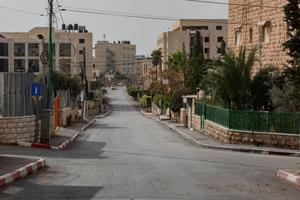The Holy Land and Christmas
EDITORIAL: For the Prince of Peace, no human turmoil can ever be too great to transcend.

This year, there will be no festive celebrations during the Christmas season in Bethlehem or in other Christian communities in the war-torn Holy Land.
That’s because local Church leaders have appropriately judged that a celebratory spirit is impermissible this year, in light of the ongoing retaliatory military campaign Israel launched in the Palestinian territory of Gaza against Hamas in response to the Oct. 7 atrocities Hamas militants committed against innocent Israelis.
Does this mean that, for the beleaguered Christians of the Holy Land, the miracle of Christmas will be stripped this year of its central meaning? No, it doesn’t.
Even in times and places like the Holy Land of today, where hatred and conflict seem indelibly entrenched, we should recall the reason why Jesus Christ chose to enter into our lives as a defenseless baby more than 2,000 years ago.
The Son of God assumed human form and was born into a humble manger in Bethlehem for a singular purpose. He came to communicate the hope of eternal salvation to a broken humanity that was suffering then, as now, from the wounds of violence, injustice, hatred and the other grave sins that are an inescapable component of living in this fallen world.
And he was born into a Holy Land that was far from peaceful.
At the time, the Jewish people were living under a brutal and oppressive Roman occupation that had stripped them of their freedoms and taxed away a large share of their incomes.
In fact, the reason the birth of Jesus took place in such a humble and difficult setting was because his mother Mary and her husband Joseph had been forced to travel to Bethlehem, in the depth of winter, to participate in a census mandated by Roman authorities. Lacking money for any better lodging when they arrived, the manger was their only option.
Holy Land residents also were subject to the despotic and sometimes-murderous whims of King Herod, who held office only courtesy of his willingness to collaborate with their hated Roman oppressors. The Gospel of Matthew recounts that, after learning from the Magi about the birth of a new king of the Jews, Herod ordered the wholesale slaughter of all boys aged 2 and under in the Bethlehem area, forcing Joseph and Mary to flee to Egypt to spare Jesus from this deadly wrath.
So, even if personally we enjoy the great blessing of celebrating Christmas in relatively peaceful circumstances, we should remember that this was not the state of affairs that greeted the earthly arrival of Our Lord. Nor has it been the prevailing situation throughout the world at virtually any time during the 2,000 years since his birth.
It’s commonly said that only a miracle can bring permanent peace to today’s Holy Land, given the seemingly unbridgeable divide between the Jewish and Palestinian peoples who jointly occupy its territory. Perhaps that’s true, humanly speaking.
Yet the birth of Jesus — Emmanuel (“God Is With Us”) — heralds the greatest miracle of all: humanity’s redemption from sin, purchased for us by Jesus’ sacrifice of himself on the cross at Calvary. For the Prince of Peace, no human turmoil can ever be too great to transcend.
Christians in the Holy Land understand this, too.
That’s why Christmas this year will be commemorated there in a muted way, but it will not be canceled.
As Michele Burke Bowe, ambassador of the Sovereign Military Order of Malta to the Palestinian Authority, eloquently explained to Fox News, “This December will be very much like that first Christmas 2,000 years ago. No gifts, no celebrations, no fireworks or festivities — just a Babe born on a deep winter night under a bright star.”
















